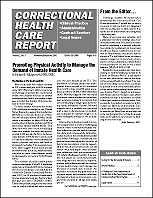Legal Developments
Author: Margaret R. Moreland, J.D., M.S.L.S..
Source: Volume 02, Number 05, July/August 2001 , pp.70-71(2)

< previous article |next article > |return to table of contents
Abstract:
In Fleming v. Uphoff, 2000 U.S. App. LEXIS 6723 (10th Cir. April 12, 2000), the Tenth Circuit Court of Appeals began its review of the lower court’s decision by noting that the plaintiff had been convicted of escape, which he claimed had been necessary “for the purpose of seeking medical care from a certain surgeon for his circulatory condition.” The Tenth Circuit Court of Appeals examined the allegations in a case where a prisoner’s requests for treatment went unanswered for more than seven weeks. McBride v. Deer, 240 F.3d 1287 (10th Cir. 2001). The prisoner, Joe R. McBride, had been shot in the leg and underwent surgery for that wound before he entered the Oklahoma County Detention Center. The Eight Circuit Court of Appeals had to deal with an even more serious issue - the question of an intentional delay in treatment while a prisoner was having a heart attack. Tlamka v. Serrell, 2001 U.S. App. LEXIS 4545 (8th Cir. March 23, 2001) was filed by the son of Frank J. Tlamka, a state prisoner in Nebraska who died in 1995 after suffering a heart attack. A Florida court was asked to review a case where a prisoner was not furnished with proper protection while he was working in a prison medical/psychiatric ward. Two similar cases turned on the issue of a delay in referral to an eye specialist.Keywords: O’Banner v. Bizzell, Snipes v. DeTella, Ruark v. Drury, Wilson v. Layne, CPR
Affiliations:
1: Pace University School of Law Library.